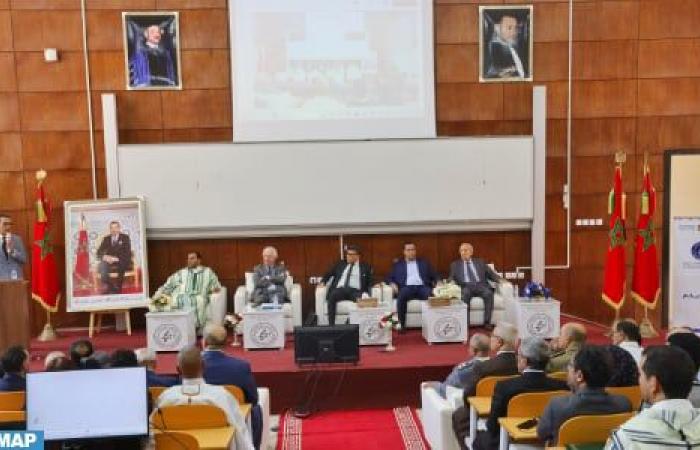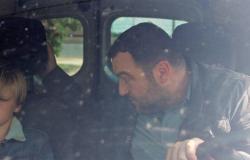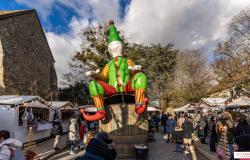Tuesday, November 5, 2024 at 11:12
Es-Semara – The convergences between the cultures and religions of the world were at the center of the debates during an international conference, held Monday at the polydisciplinary Faculty of Es-Semara, with the participation of a host of researchers and Moroccan and foreign religious figures.
This three-day conference (from November 4 to 6) is part of the activities of the 2nd edition of the Es-Semara meetings, initiated under the theme “Living together” by the Ribat Al Fath Association for Development Sustainable Development and the France-Morocco Peace and Sustainable Development Foundation.
During this meeting, in which the governor of the province of Es-Semara, Brahim Boutoumilate, as well as several elected officials, notables and students took part, the participants underlined that Morocco has always been a land of coexistence for diverse civilizations, cultures and religions.
The various speakers underlined that the aim of the 2nd edition of the Es-Semara meetings is to promote convergence between the cultures and religions of the world and to facilitate “living together” for Jews, Christians and Muslims.
Speaking at the opening of this meeting, the president of the France-Morocco Peace and Sustainable Development Foundation, Hubert Seillan, considered it necessary to ensure the convergence of religions and cultures, particularly in a delicate global situation marked by conflicts and violence, while calling for the dissemination of the principles of living together.
In this wake, Mr. Seillan noted that the work of this 2nd edition will address a series of themes linked to “Living together”, relating in particular to altruism, openness and acceptance of others, the quality of living conditions, the art of living and social relations.
These meetings held in person and via videoconference bring together followers of the three major monotheistic religions in a spirit of exchange and dialogue, he continued.
“Es-Semara enjoys serenity and peace,” he added, noting that the choice of this city is wise to disseminate fundamental moral messages.
Furthermore, he indicated that the works of this edition will be listed in a collective book which will be published soon.
For his part, the governor of the province, Brahim Boutoumilate, stressed that these meetings aim to promote a sincere and open dialogue between cultures and beliefs, welcoming Es-Semara’s hosting of this important scientific event, given that it is the spiritual capital of the southern provinces of the Kingdom and a place of symbolic richness, anchored in a tradition of tolerance and openness.
In a world that seems to be getting lost in violence and division, it is more essential than ever to celebrate the universal values of tolerance, respect, hope, and faith, said Mr. Boutoumilate, stressing the need to reconnect with these virtues which constitute a sine qua non condition for living together, despite rivalries and contempt.
On another note, the territorial manager recalled that these meetings are part of the logic of the Franco-Moroccan agreements consolidated during the state visit of President Emmanuel Macron in October 2024, adding that “this commitment marks a common desire to “encourage cooperation and dialogue between our peoples, by taking concrete actions to bring cultures together”.
For his part, the anthropologist and specialist in Sufism, Faouzi Skali, observed that the entire history of religions has been and continues to be crossed by two contradictory tendencies of closed and open, according to a terminology of Jacques Berque, a French orientalist sociologist and anthropologist.
Mr. Skali, in this sense, emphasized the different facets of the concepts of closed and open, calling for the founding of an open society on art, culture and science and the recognition of otherness. and the diversity of beliefs and not on the darkness of obscurantist ideologies.
Likewise, he made it known that this meeting aims to work to make known and recognize the conditions for the resurgence of new paradigms for the creation of a common civilization which restores to man his full place, his verticality, his dignity and his quest for meaning that no purely technological and transhumanist civilization can ever offer him.
The Consul General of the Union of Comoros in Laâyoune, Said Omar Said Hassane, for his part, reaffirmed his country’s position in favor of the territorial integrity and national sovereignty of Morocco.
Mr. Said Hassane, who is also the dean of the consular corps in Laâyoune, stressed that Morocco promotes the peaceful coexistence of religious beliefs, paying particular attention to the promotion of mutual respect.
Likewise, he made it known that through inter-religious and inter-cultural dialogue, the African continent can move towards more inclusive conflict management.
Taking part in this meeting, which continues until November 6, were the vice-president of the Ribat Al Fath Association for Sustainable Development, Mustapha El Jaouhri, the Archbishop of Rabat, Cristobal Lopez Romero, the professor of the University of Montreal, specialist in Islamic-Christian dialogue, Patrice Brodeur, and the president of the Sephardic Community of Canada, Avraham Elarar.
They are also the dean of the polydisciplinary faculty of Es-Semara, Abdeljalil Idrissi, elected officials, consuls general accredited in Laâyoune and sheikhs and notables of the tribes, as well as a host of Moroccan and foreigners.






